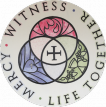5/15/2014 11:29:30 AM
In Memoriam + Roland Essig 1930-2014+
Posted under: Funerals
May 14, 2013
Text: John 14:1-14
In Nomine Jesu
Sad but true. Many stories are never told, never finished. They are buried in the garden of estrangement, they sink into the depths of the sea, they are scattered over the entire earth, a piece here, a piece there. We are blown by the wind, to and fro, our flesh fading, withering unto death, like the grass of the prairie and the flowers of the field. While Roland was a man of impeccable detail, death saw to it that he left many things unfinished. Death is always to soon even for those who await its eager arrival. Death is always to soon even for those who believe and know that death in Christ is the way to eternal life. Death is to soon even for those whose troubled heart is quieted by the solemn voice of Jesus, for at that moment we cannot hear His voice, the wound is too deep, the sting too sharp. We are never ready. Just ask the disciples. Ask Thomas. Never do we want to let go of them, to loose their flesh, to loose their physical embrace. And when we do, we are mystified as to exactly where they have gone, what is their consciousness, and how it is that we shall follow them, how we shall meet again. We are never ready. Death is always too soon.
This night, in death’s dark vale, I address no grieving widow or sons or daughters or blood relatives. Yet there is a grieving family. It’s you; the pilgrims of pilgrim. The holy Christian Church in this place has yet again suffered the blow of Satan, of his minions of sin and death. Don’t gloss over the fact that Roland was your brother, a fellow warrior, a fellow traveler along the way, a pilgrim in this barren land seeking Him who is the Way, the Truth, and the Life. Tonight, Roland’s funeral teaches us something incredibly important, something that we have no doubt lost in an ever growing transient and disembodied society. Roland’s funeral teaches us the intimate reality of God and His people, of His people dwelling together in a common confession and fellowship, in a singular hope and life. It’s tragic in our day when even the Christian funeral is seen by many as purely focused on grief management and the comfort of the bereaved. It should be no surprise to us that when a funeral is essentially defined as religious grief therapy people stay away, or they find other ways of expressing their condolences to the family. As vital as comfort at the time of grief is, it’s only one outcome of a Christian funeral, not the main purpose. The Christian funeral is about confessing a particular way, truth, and life. It’s about the reality of sin, humanity’s redemption, and man’s destiny in the God who became flesh and has dwelt among us, full of grace and truth. It’s not about denial, closure, and abstract promises of better places and far away celestial lands. It’s about the one story that has been finished, finished our sin and death, nothing left undone, but all things done, the way prepared, the truth forged in the burning irons of skepticism, and abundant life wrought out of the jaws of death. Exiled unto death because of our sins, we need to be assured, the church needs to remember, and the world needs to be told that death does not speak the final word. The Christian funeral is of a completely different narrative, one that the world doesn’t get, one in which the Father is only seen through the bitter, sufferings, and death of the Son, and only through the Son can we know the Father, that He has spoken through His Son the final resurrecting Word.
As we live embodied in the world we have stories of the world. Roland had plenty to write about, collect, and share over his 83 years of life. His life was one of adventure, intrigue, and faithfulness. We can salute his faithful service in the navy throughout Europe in the grueling fight against communist aggression. We can chuckle that when in Rome he didn’t do as the Romans do, kneeling and kissing the ring of Pope Pius XII, but remained standing and shook his hand. We can recognize the works of this man’s hands as he operated and owned his own printing business for 37 years here in West Bend. We can crack a smile remembering that continuous stream of letters to the editor in the West Bend Daily News about principles of economy and common sense. We can be enchanted by his insatiable passion and precision for stamp collecting and for his love of flowers that got him city wide notoriety. All of this is good and well. But we do not sit here as a family of Christ reflecting about the life of Roland, seeking comfort in the hollow thought that though the body is dead, the soul lives on. Roland was governed by the gospel, and so shall the funeral be for the Christian. The Gospel governs are lives, it is our life, now and forever. It’s built on the very Word of Him who is the enfleshed Gospel, “Let not your hearts be troubled. Believe in God, believe also in me. In my Father’s house there are many rooms [dwelling places].” Jesus says, that God, whom you have never seen, look at Me, and you will see Him. Not an example of Him. But you will see Him. If you have seen Me, you have seen the Father. In Jesus you have the fullness of God, the birth of end time hope, that Roland is not some static corpse or gaseous and disembodied spirit, but an embodied child of God moving toward the communion of the saints.
One of the earliest descriptions of the Christian faith was “the people of the Way” [Acts 9:2]. Roland knew the way simply because he was claimed by Him who is the Way. In Holy Baptism, Jesus birthed Roland from above, baptized him into Himself, in the community of saints, His body, the Church. Holy Baptism is a sacrament of life, a way of life. Not a haphazard journey, but a narrow and specific one. Only through Son do you know and come into the many dwelling places of the Father’s eternal kingdom. There are not many ways of life, but One life, which is given to all so that they would have a room in the Father’s house. This life resides in the Son, and in the Son’s sons, in Roland, in you, His children. The presence therefore of the faithful community of saints is not to be forgotten. It’s some sort of religious “add on” to an otherwise private family moment of grief and burial. For the Christian then, death is never a private matter, but a communal matter, a wound to be salved by the gospel spoken by those who walk in and along the same way. Even when dying takes place in the solitude of a hospice home, in the isolating depths of darkness, the dying are nonetheless surround by the prayers of the church, carried unto God by His angelic messengers, commended to Father through the Son’s death and resurrection.
The Gospel answers Thomas’ question. It tells him about the truth of where Jesus is going. First He is going to the cross, to suffer and die for your sins. Then He will ascend unto His Father, so that where He has gone, you too shall follow. Jesus is the way and the way is Jesus. All human beings must move their dead from here to there, but it is the Gospel story that defines for us the truth about where “here” and “there” are, that names the “here” as the life of Jesus which we share of, and eat of, drink of, hear of, and the “there” as the place in the arms of God, toward which our brother Roland has gone. So you know where Roland has gone. You know the way. You know what it is: the way of confessing and absolution, of hearing the Father through the Son’s Word, of living in His lavishing washing of new birth and renewal in the Holy Spirit and eating and drinking His Supper. That is the way. And in this way, Roland has followed the Son unto the Father’s house, His joyful place of eternal peace, where many rooms abide. Soon this body we lay into the grave will follow Jesus out of the tomb. Jesus will not stand for the belief that His creation, mirrored in His own image, descends into some static corpse used for fertilizer or a disembodied spirit floating in some hazy heavenly better place. No. Roland is an embodied child of God moving in the way of Jesus unto the Father everlasting. For Jesus is the Way, the Truth, and the Life, the reconciling bridge to His Father. He will not suffer Roland, or any of His children to endure corruption. He will not abandon them to the grave. He will raise them up, body and soul together, immortal and incorruptible, even as He is risen, lives and reigns to all eternity.
With a smidge of humor and a robust theological declaration, Roland would have you know that he was preceded in death by His parents Adam and Eve. He wanted you to know where He had come from and where He was going. He wanted you to know that we all die in Adam our first father, yet even more, he wanted to you know where He was going: to the Father’s eternal kingdom who had forgiven all his sin, made him alive, and created him anew in the second Adam, Jesus Christ.
Yes many of our stories are sad, unfinished, broken pieces lying here and there, but this story has been written for us in blood, finished for us and for our salvation. We are buried in the garden of future budding, as we sink deeply into the forgiveness and love, the life and way of Christ. No more are we scattered and broken, but wholly remade in both body and soul, children of the heavenly Father, sons and daughters who confess and know that their Redeemer lives. The Sun of Righteousness has gloriously arisen, giving light to those who live in the mansion of the Father’s many rooms—and at the same time giving redeeming promised light to all who still walk in darkness and the shadow of death; this family in Christ who awaits its own joyful resurrection reunion in Him who is the Way the Truth, and the Life of ageless ages.
In the Name of the Father, and of the Son [+] and of the Holy Spirit. Amen.


